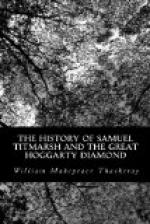“The bramble, the bramble,
The jolly jolly bramble!”
one of Charles Kemble’s famous songs in “Maid Marian;” a play that was all the rage then, taken from a famous story-book by one Peacock, a clerk in the India House; and a precious good place he has too.
When Brough heard how Master Swinney abused him, and had his admission to the theatre, he came one day down to the office where we all were, four-and-twenty of us, and made one of the most beautiful speeches I ever heard in my life. He said that for slander he did not care, contumely was the lot of every public man who had austere principles of his own, and acted by them austerely; but what he did care for was the character of every single gentleman forming a part of the Independent West Diddlesex Association. The welfare of thousands was in their keeping; millions of money were daily passing through their hands; the City—the country looked upon them for order, honesty, and good example. And if he found amongst those whom he considered as his children—those whom he loved as his own flesh and blood—that that order was departed from, that that regularity was not maintained, that that good example was not kept up (Mr. B. always spoke in this emphatic way)—if he found his children departing from the wholesome rules of morality, religion, and decorum—if he found in high or low—in the head clerk at six hundred a year down to the porter who cleaned the steps—if he found the slightest taint of dissipation, he would cast the offender from him—yea, though he were his own son, he would cast him from him!
As he spoke this, Mr. Brough burst into tears; and we who didn’t know what was coming, looked at each other as pale as parsnips: all except Swinney, who was twelfth clerk, and made believe to whistle. When Mr. B. had wiped his eyes and recovered himself, he turned round; and oh, how my heart thumped as he looked me full in the face! How it was relieved, though, when he shouted out in a thundering voice—




